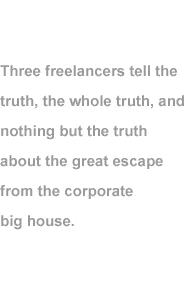 |
|
||||||||||||
 |
|
||||||||||||

|

|
|
|
Recently, an 1099 reader asked us for advice about making the transition from wage slavery to self-employment. In response, we whipped up a list of things aspiring IPs should consider as they prepare for a solo career. Then we asked a few practicing IPs what they thought of our advice. Did we miss anything? Is our checklist realistic? Did we get anything (gulp) wrong? Scroll down to find out what Anne Freestone, a freelance writer and editor, architect Joseph Kennard, and Lisa Kivirist, author of Kiss Off Corporate America: A Young Professional's Guide to Independence, had to say. Choosing A Field 1099's Advice: Many IPs start by doing freelance work similar to what they've already done in a regular job. True, there are fields in which it's hard to freelance (for example, firefighting and mail delivery), but most regular jobs have some close analog in the IP world. The advantage to freelancing in a field you already know is that you only have to master one new set of skills (the art of self-employment) rather than two (self-employment, plus the field itself). Kivirist: Yes, it is easier to enter the world of self-employment based on your existing skills and contacts (I call these "dreamfunders" in Kiss Off). But do remember that your existing "skills" from the corporate world may be more universal and applicable than you may think. For example, in my corporate years I worked in an advertising agency. I didn't freelance in advertising specifically when I became self-employed, but rather applied the skill set I had developed there (i.e., marketing, account/client management, presentation skills, etc.) in fields I was more interested in. Freestone: I have a master's degree in magazine publishing from Northwestern University and nine years of high-tech writing experience, but I was still nervous about making the transition from a dimly lit cubicle in a large corporation to a corner office with a window in my house. I thought it would be like jumping off a cliff, but it was really like stepping off a curb. Why was it easier than I thought? By chance, a management-consulting firm that was doing some work for my former company asked me to design and edit its newsletter. (Let's just say I was moonlighting. The consulting firm had seen my work and liked it, so they hired me.) This gave me the shot in the arm I needed to seriously contemplate leaving my job. I said to myself, "Hey, maybe, just maybe, some other desperate souls might also need my help." Kennard: Choosing a field seems to be the easy part. There are so many new issues to deal with when becoming an IP that you need to be confident in your profession. I cannot imagine changing fields and becoming an IP at the same time. On top of getting my "work" done, I'm now dealing with a lot of financial issues (banks, credit, loans, accounting) and marketing issues (promotional material, graphic designers, photographers, portfolio, Web site, schmoozing). I also have to deal with lawyers, consultants, office equipment, furniture, and supplies, and the list goes on. Marketing Yourself 1099's Advice: By far the biggest problem for most IPs, especially those just starting out, is finding clients. The most common source of work is word-of-mouth referrals from former colleagues. There are, however, other sources of work. For instance, you should talk about your freelance plans to everybody you know -- and we mean everybody. You can never guess how informal networking will work out. Do this even if you don't have a single client and have never actually done a freelance assignment. If you're embarrassed about this or bashful about marketing yourself in general, get over it. Also, you might want to register with an online directory so more clients can find you. (Registration is usually free.) Freestone: I felt confident about my skills as a writer and editor, but I was not sure of my skills as a salesperson. I knew I could do the work, but could I find clients and convince them to hire me? I was not so sure. My motto quickly became "Talk is cheap, so do a lot of it." At first I mentioned to everyone I met that I was freelancing -- you don’t know who they know or what ideas they might have. Then I extended my motto to "Emails are as cheap as talk." To get started and connected with my bread-and-butter clients, I worked the Internet and ended up joining a high-tech communications group that connects freelancers like me with companies who need help from consultants. My approach to finding work on the Internet was simple: I typed the words "freelance writing" into various search engines and found links to check out. Sunoasis Jobs and About.com are sites that I like, and my writer friends do as well. But my best Internet lead came from the high-tech email group I joined: though it cost an application fee of $50, it was the best $50 I ever spent. It got me a terrific gig editing a finance magazine. How did I get a finance job through a high-tech network? As a favor to the finance magazine, the high-tech organization notified its members that this finance magazine needed a freelance editor. I quickly emailed the editor, and I have been rewriting/editing for them since April. Kennard: I always have to remind myself that marketing is an ongoing effort. The ramifications of your marketing efforts are typically off in the future, when you will be finishing your current assignments and in need of new work. When I was considering becoming an IP, my first move was to let people know my intentions so that I could secure some work before leaving my job. You should try this: it's a good litmus test to see what kind of response is fostered from potential clients and how to convert that potential into real work -- enough to get you started, anyway. Your Skill Level 1099's Advice: Your field-specific skills need to be really solid. If they're not, you may be better off learning on someone else's time, or perhaps apprenticing. If you're still in learning mode when you begin, you should have a cushion of cash in the bank (or a financially supportive relative) because you're unlikely to earn much while you're educating yourself. Freestone: Fortunately, my skill set has been my calling card, and, in some bizarre cases, I’ve simply had to tell an editor about my background and an assignment would land in my lap. As a high-tech writer, I can understand things I can't feel or touch, like ATM software. My technical writing experience is sometimes enough to get me a new job -- though usually it's not that easy, and a packet of writing samples is required. Kivirist:
You need to find a balance between developing "solid" skills, taking
the risk, and moving out on your own. It is easy to get stuck in a corporate
rut, never feeling fully "ready" (when will you ever be?) and never
getting out. Also, on the financial note, it is more than just having
a cash cushion to fall back on. You really need to alter your lifestyle
habits -- simplify and "frugilfy" -- to make the financial transition
work. You need to be more committed to leading your own, self-employed
life rather than having microbrews and the latest, greatest trendy wardrobe.
|
||||
| |||||
|
December 3, 1999 Primary Editor: Ken Gordon Illustrator: Steve Smallwood Production: Keith Gendel |
We'd love to hear your comments about this article! | ||||
| |||||